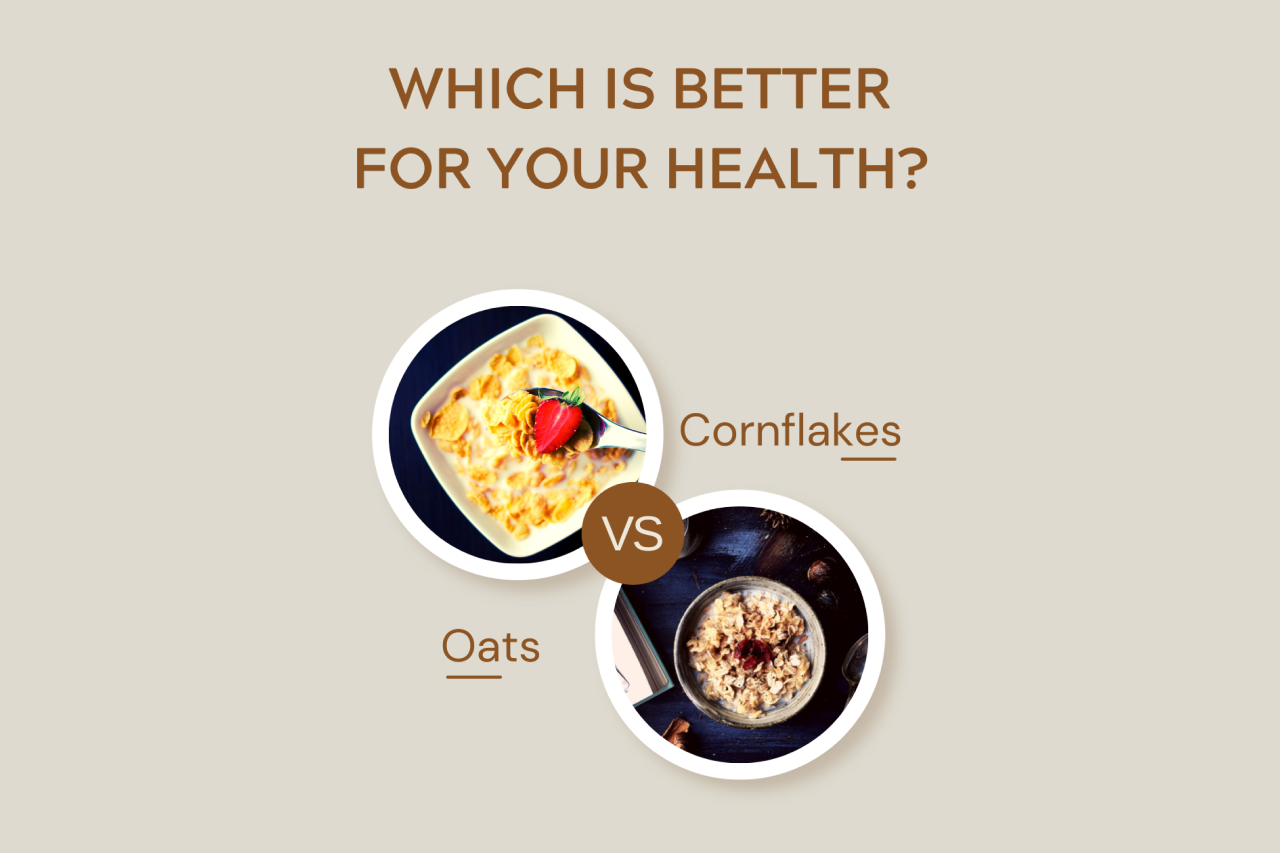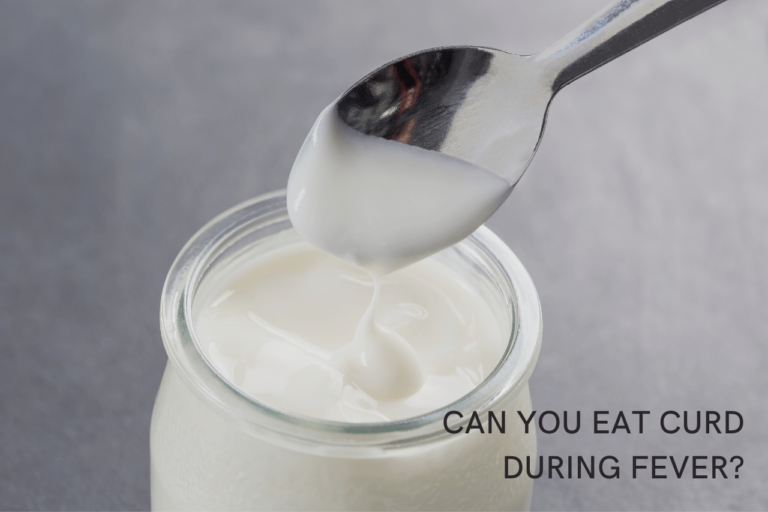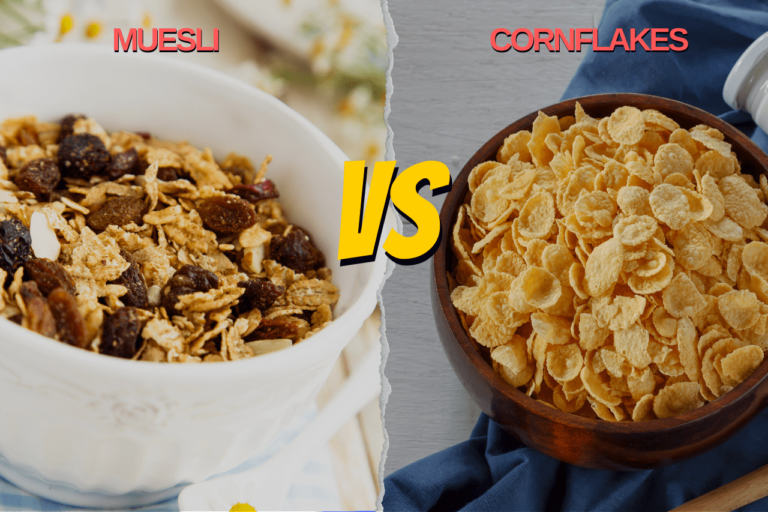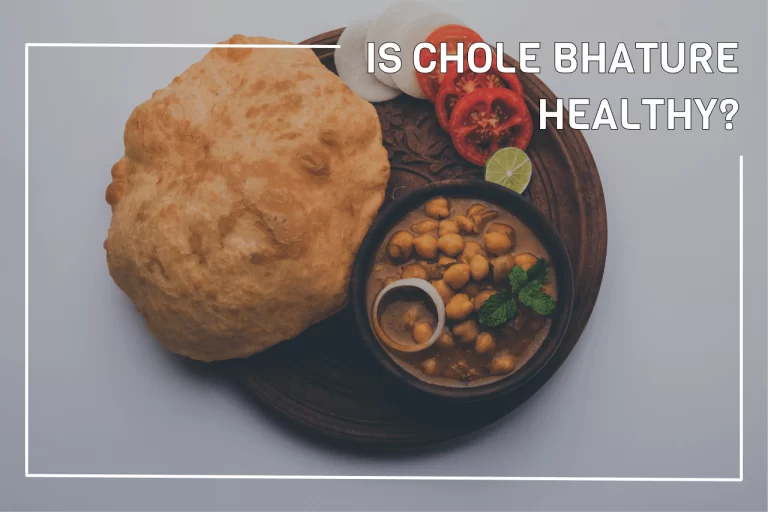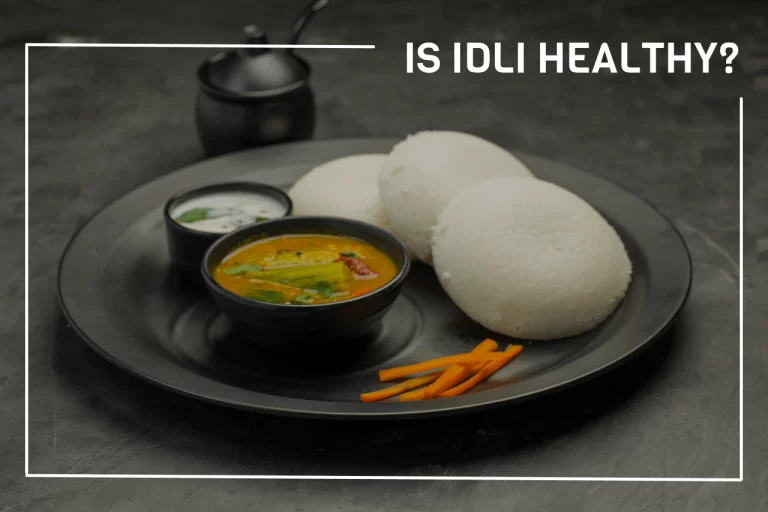Cornflakes and oats are the two of the most popular breakfast cereals in the world.
Both the cereals are made from whole grains and are packed with many essential nutrients for you body. And while both can be a part of healthy breakfast, which one is better for you? Cornflakes or oats?
Short answer: Oats are a better breakfast option than cornflakes because they are high in nutrients such as protein and fiber, contain less sugar, has more benefits, and are minimally processed.
I have compared cornflakes against oats below in detail that will help you choose better breakfast option for you.
So, let’s begin.
Also read: Soya Chunks vs Chicken: Which Is Better For Your Health?
What are cornflakes?
Cornflakes are breakfast cereal made from corn. They were created by Will Kellogg in 1984 for his patients at the hospital. The original cornflakes were made using wheat.
The idea of cornflakes proved popular in the 19th century, becoming one of that time’s most consumed breakfast cereals.
Today, cornflakes dominate the breakfast cereals in many countries, with brands like Kellogg, PepsiCo, Bagrrys, and Marico as leading players.
The cornflakes fall into the Ready-To-Eat (RTE) Breakfast Cereals. Other breakfast cereals in this category include chocos, wheat flakes, and muesli.
What are Oats?
Oats are another popular breakfast cereals that have recently gained tremendous popularity.
They are made from cereal grain and are most commonly eaten in the form of oatmeal or rolled oats, made by cooking the oats in water or milk.
As per reports, oats are growing much faster than cornflakes as people are getting more health-conscious. This means that in some upcoming years, oats may surpass the popularity and consumption of cornflakes.
The oats fall into the category of Hot breakfast cereals.
Cornflakes vs Oats: Nutritional value
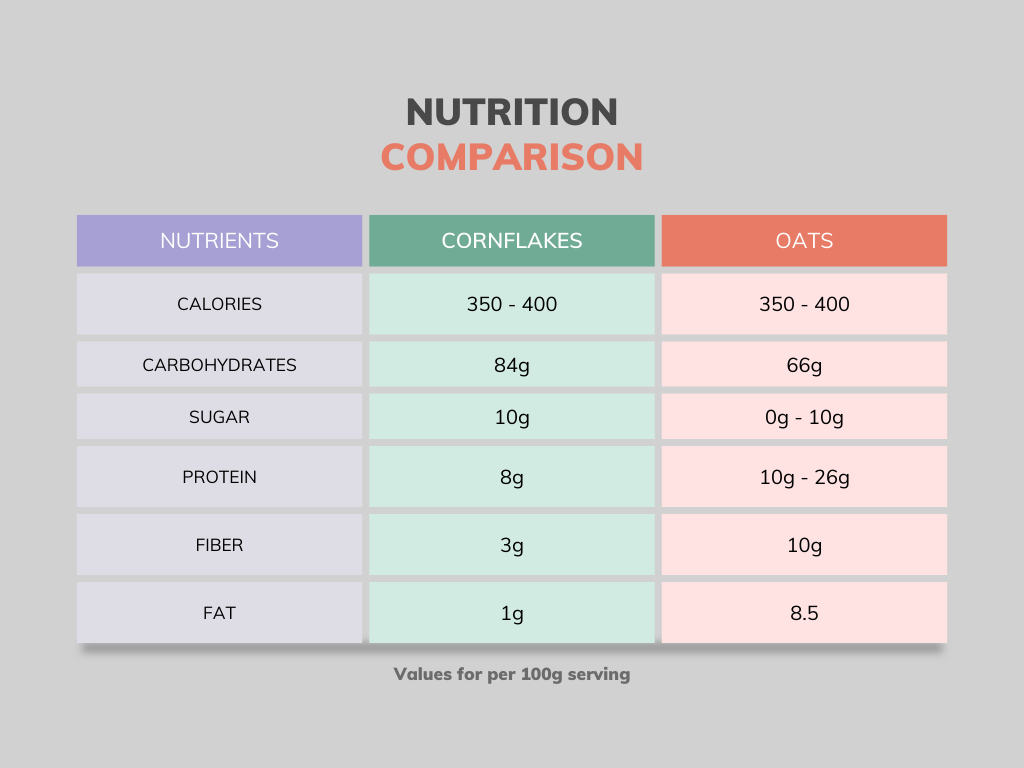
Calories
It is essential to be mindful of the calorie intake in your diet. If you are looking to gain weight, you will need to consume more calories. On the other hand, if you are aiming to lose weight, you will need to limit your calorie intake.
There is not a big difference in calories between cornflakes and oats. A 100g serving of cornflakes can contain up to 350 to 400 calories, while the same amount of oats can also have 350 to 400 calories.
However, when choosing either option, you will need to check the source of the calories. If the calories come from sugar and fat, it is best to avoid that option.
Protein
Protein is often the first macronutrient that people look for on a nutrition label. That’s because more protein generally means that the food is more nutritious.
On average, a 100g serving of cornflakes can contain up to 8g of protein, while oats can contain up to 26g of protein.
Overall, if you want more protein in your breakfast, it’s better to go with oats than cornflakes.
Fiber
Eating a good amount of fiber in your breakfast is important as it helps you feel fuller and more satisfied throughout the day.
Oats are generally considered a good source of fiber compared to cornflakes as they are made from whole grains. A single 100g serving of oats can contain up to 10g of fiber.
Carbohydrates
Carbohydrates are essential to breakfast as they are the body’s preferred energy source. However, it is important to remember to consume complex carbs and avoid simple carbs.
Cornflakes are essentially simple carbs as they are highly processed and not good for your health. However, oats are packed with complex healthy carbs and are an excellent way to fuel your body.
Also read: Which One Is Better? A Comparison Of Brown Bread Vs White Bread
Sugar
As more and more people become health-conscious, they are avoiding foods containing sugar.
While it is generally believed that oats have less sugar than cornflakes, this is not always the case. You can find many oats on the market that have high sugar content per serving.
So when it comes to sugar, it is always best to check the amount on the nutrition label.
Fat
While oats generally have higher fat content than cornflakes, this does not mean that oats are bad for you. In fact, oats contain a significantly higher percentage of healthy fats, such as monounsaturated and polyunsaturated fats, which are beneficial to heart health.
A single serving of oats contains up to 80% healthy fats, while cornflakes only have 50% of their fats as healthy fats.
Vitamins and Minerals
Both cornflakes and oats are good sources of vitamins and minerals. While cornflakes are fortified with vitamins and minerals, oats are naturally higher in vitamins and minerals.
It’s always best to check the nutrition label before choosing between cornflakes and oats.
Cornflakes vs Oats: Benefits Comparison
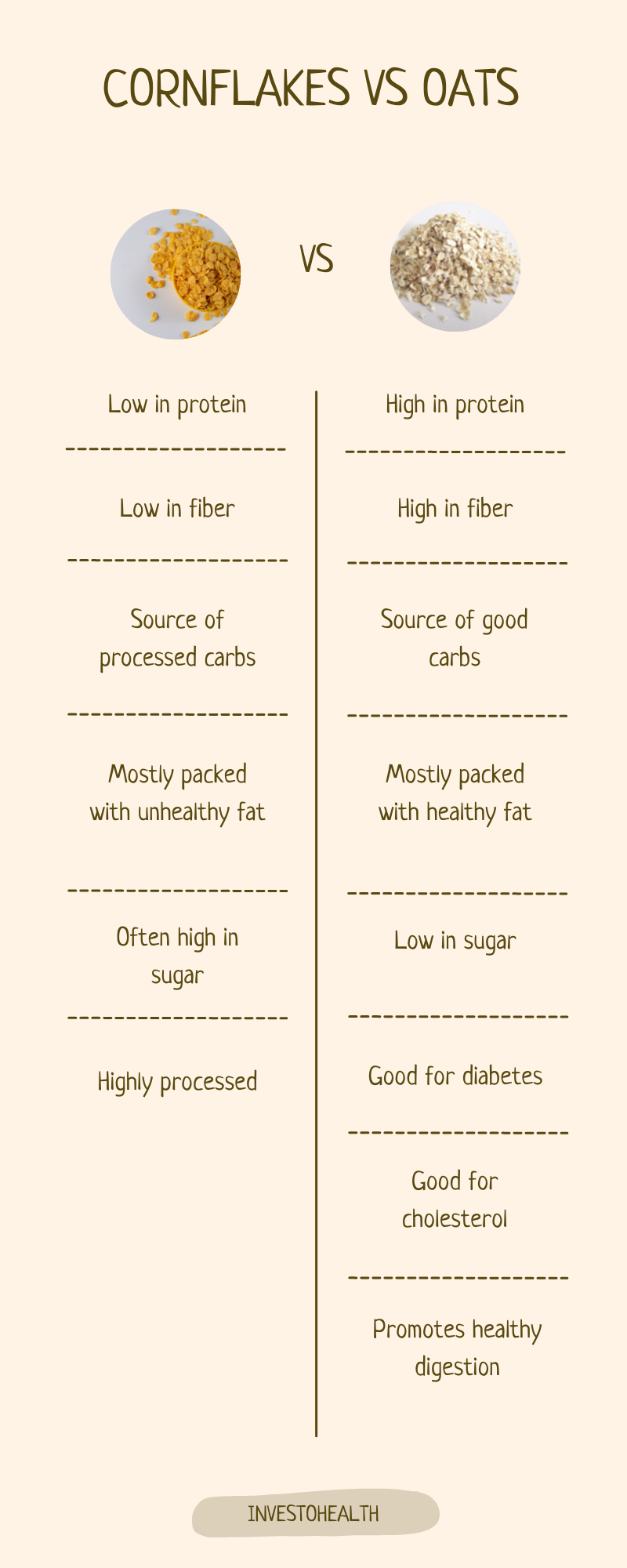
Bodybuilding
If you are looking to build muscles, there’s no doubt that you will need more protein.
Oats are a perfect choice to include in bodybuilding as they are higher in protein than cornflakes, which are essential for muscle growth.
Additionally, they are also a good source of complex carbs, which will provide you with a lot of energy to go through your workouts.
Weight loss
Many people who want to lose weight turn to breakfast cereals, believing they will help them slim down. However, this is not always the case, as most breakfast cereals on the market are loaded with sugar in the form of malt syrup, corn syrup, refined sugar, and artificial sweeteners.
Oats are a better breakfast choice for weight loss than cornflakes because they are a good source of fiber, protein, and complex carbs.
All these nutrients in oats help you feel fuller for a longer time and keep your blood sugar level in check, ultimately enabling you to eat less and lose weight.
Also read: 5 Reasons Why Cornflakes Are Not Good For Weight Loss
Diabetes
While both cornflakes and oats contain calories and carbohydrates, oats have a lower glycemic index than cornflakes. This means that oats raise blood sugar levels more slowly than cornflakes.
Additionally, oats are a good source of beta-glucan, a soluble fiber that helps to improve insulin resistance.
However, when choosing oats for diabetes, steel-cut oats are best as they are the least processed.
Heart health
Oats are the best breakfast choice compared to cornflakes to improve your heart health. All thanks to the high nutrient profile and beta-glucan present in it.
As per studies, consuming oats or oats-based products in humans can lead to a 16% reduction in overall cholesterol and a 28% reduction in LDL cholesterol.
This is why oats boxes come with the label of Heart healthy.
Digestive health
Frankly, I often experience digestive issues like bloating and constipation after breakfast. However, when I eat oats in my breakfast, I don’t feel heavy and don’t suffer from any digestive issues. In fact, I feel fuller and more powered.
This is because oats are a high-fiber food, which means they help to keep things moving along the digestive tract. They also contain prebiotics, which are food for the good bacteria in the gut.
These two factors make oats an excellent breakfast choice for those looking to improve their digestive health.
Final words: Which one is better breakfast option?
After considering the nutrition value and benefits of both cornflakes and oats, it is clear that oats are the more beneficial choice. There are several reasons for this, such as:
- Oats are high in protein
- Oats are minimally processed
- Oats contain more fiber
- Oats contain less or no sugar
- Oats are good for cholesterol
- Oats are good for diabetes
- Oats are good for muscle building
However, this doesn’t mean you can’t have cornflakes in your breakfast.
In fact, most cornflakes in the market are fortified with vitamins and minerals. You only need to keep an eye on the sugar level and the ingredients used in it.
Found this information helpful? Share it with the world.
Here are a few other posts that might be helpful for you:
